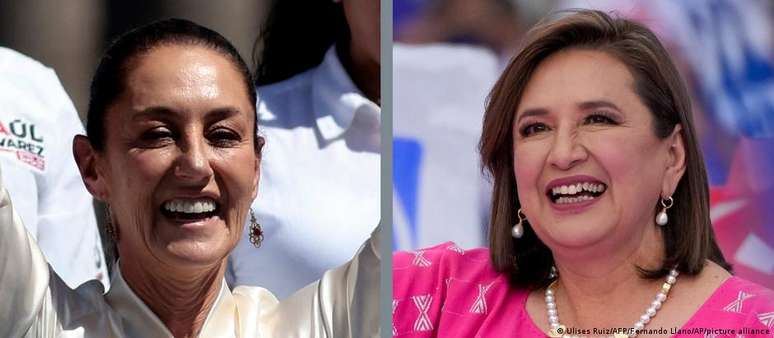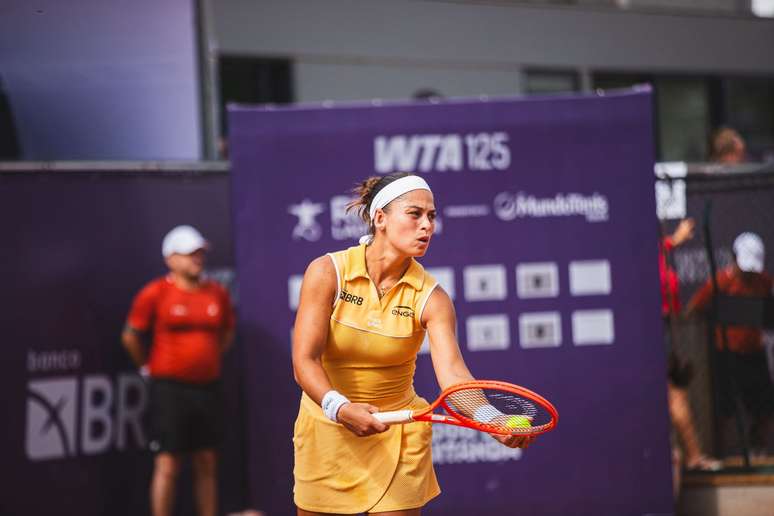The country is expected to elect its first female president on Sunday. López Obrador’s legacy of social programs and growing gang violence dominated the campaign. Mexicans will go to the polls this Sunday (02/06) to choose the occupants of more than 20 thousand elected seats, including the next president, who for the first time. in Mexican history, she must be a woman.
The two main candidates for the country’s top leadership are Claudia Sheinbaum, supported by the current Mexican leader, Andrés Manuel López Obrador, and the opposition Bertha Xóchitl Gálvez.
Also up for grabs are 500 seats in the House of Representatives and 128 in the Senate, the leadership of seven state and municipal governments and thousands of local legislative positions. Nearly 99 million Mexicans have the right to vote.
Attention is more focused on the choice of the new president, which will be a referendum on the performance of López Obrador, who has led Latin America’s second largest economy since December 2018.
How was López Obrador’s government?
The president was elected on a left-wing populist platform, promising to expand social benefits and fight corruption and violence, and ends his term with high approval. As of April, his government had the average support of 66% of Mexicans, according to an opinion poll aggregator from the AS/COA organization.
One of López Obrador’s strengths has been the expansion of social programs, the creation of a universal pension and the increase in the minimum wage. Ignacio Ibarra, from the Instituto Tecnológico de Monterrey, told DW that during his tenure there had been a reduction in poverty, an increase in average income and a reduction in the wage gap between men and women. According to the aggregator AS/COA, government action in the field of social programs is considered positive by 72% of Mexicans.
In the fight against organized crime the scenario is the opposite. Only 23% believe their government has done a good job in the area. During the campaign, the president highlighted the 5% drop in homicides in 2023 compared to the previous year, but about 30,000 people are still killed each year in Mexico, and more people have been killed during his term than in any other country of the country modern history of Mexico.
The government has invested in the increasing use of the army to combat violence, but without decisive success against gangs and cartels, which exercise great power over some areas of the country.
Affiliated with the National Regeneration Movement (Morena), López Obrador has not been directly involved in major corruption scandals and has cultivated closeness to voters through popular language and daily press conferences. During his tenure, he has used referendums to enforce controversial policies and even pushed for a recall in 2022 to confirm whether voters would like him to remain in office.
On the economic level, López Obrador has put the government on a favorable trajectory, with a growing GDP per capita, declining inflation and a positive trade balance. Mexican exports reached an all-time high in 2023 and the country has benefited from growing economic integration with the United States and investment from Western companies that are gradually trying to reduce their dependence on Chinese factories.
Víctor Gómez Ayala, director of data analysis at the Mexican Institute for Competitiveness (IMCO), told DW that there was also an effort by the administration to control public spending, “contrary to what has been seen in the cases of other left-wing populist governments in Latin America during this period”.
Violence in the countryside
The problem of public security is also reflected in the electoral campaign, which is already the most violent in the history of Mexico. From September to May, 34 candidates or pre-candidates were killed, more than the 24 candidates killed in the 2018 campaign. According to risk consultancy Integralia, there were 560 incidents of violence against candidates, more than the 389 in the last campaign .
Most of these incidents are linked to the actions of gangs seeking to control territories, influence the political dispute and eliminate opponents, which has led several candidates to withdraw from the race.
The federal government mobilized the military to ensure the protection of 465 candidates, mobilizing 3,000 soldiers for this purpose, a small portion of the total number of candidates in the dispute.
The elections will be closely monitored by international observers. The National Electoral Institute reported it had accredited 1,309 outside observers, the highest number since 1994, when the practice began. The Permanent Conference of Political Parties of Latin America and the Caribbean will send 120 observers, the Organization of American States, 100, and the US Embassy in Mexico, 76.
The two main candidates
Government leader Sheinbaum served as mayor of Mexico City before being chosen by López Obrador as the name for his succession. The granddaughter of Jewish immigrants, she holds a doctorate in engineering and has worked as a researcher in the field of sustainability, which differentiates her in this sense from the current president, who has not prioritized the fight against climate change.
The other candidate is Revolutionary. Institutional Party (PRI), which governed Mexico from 1929 to 2000.
He studied computer science and has a technology company. Gálvez wears indigenous clothing, travels by bicycle and is a harsh critic of the government in relation to fighting organized crime. Today you are a senator and member of a conservative party, but you have liberal positions on abortion and marijuana.
Sheinbaum leads the race with an advantage of 20 percentage points, according to an electoral poll carried out by the Buendía & Márque company and published Tuesday by the newspaper El Universal. The poll was conducted May 16-26 and surveyed 2,000 voters.
Sheinbaum has 54% of voting intentions, compared to 34% for Gálvez. In third place is the candidate Jorge Álvarez Máynez, of the Movimiento Ciudadano (MC).
In addition to electing the first female president, this year’s elections are the first in which there will be gender equality among candidates, thanks to a reform approved in 2019.
Saraí Aguilar, a professor at the Autonomous University of Nuevo León and a specialist in culture with a gender perspective, told DW that it will be an important milestone to “break the glass ceiling, reach the highest position of power”, but “we have to be aware that this will not necessarily advance the feminist agenda.”
Sheinbaum promised to advance a bill against indirect violence, which especially affects women, but, according to Aguilar, when he was mayor he repressed women’s protests. Gálvez has already said she is a defender of abortion rights and wants to expand women’s economic inclusion and gender equality in the judiciary, but she is a member of a conservative party that traditionally opposes the banners of the feminist movement.
Regarding public security, Gálvez proposes to reverse the militarization implemented by López Obrador, strengthening the National Civil Police and reforming the prison system, partly controlled by organized crime.
The government’s Sheinbaum proposes to further advance the militarization of the National Guard: the army enjoys great trust among Mexicans, and they are seen as public agents less exposed to corruption thanks to their higher salaries, compared to those of the local police.
In addition to violence, another issue that will require the future president’s attention is how to address the growing flow of immigrants arriving in Mexico with the goal of trying to enter the United States.
bl (Reuters, DW, ots)
Source: Terra
Rose James is a Gossipify movie and series reviewer known for her in-depth analysis and unique perspective on the latest releases. With a background in film studies, she provides engaging and informative reviews, and keeps readers up to date with industry trends and emerging talents.


![Tomorrow belongs to us: What awaits you in the episodes of 2052 and 2053 on October 15, 2025 [SPOILERS] Tomorrow belongs to us: What awaits you in the episodes of 2052 and 2053 on October 15, 2025 [SPOILERS]](https://fr.web.img6.acsta.net/img/39/95/3995a2d00abbf3c01161818d01a95388.jpg)



